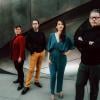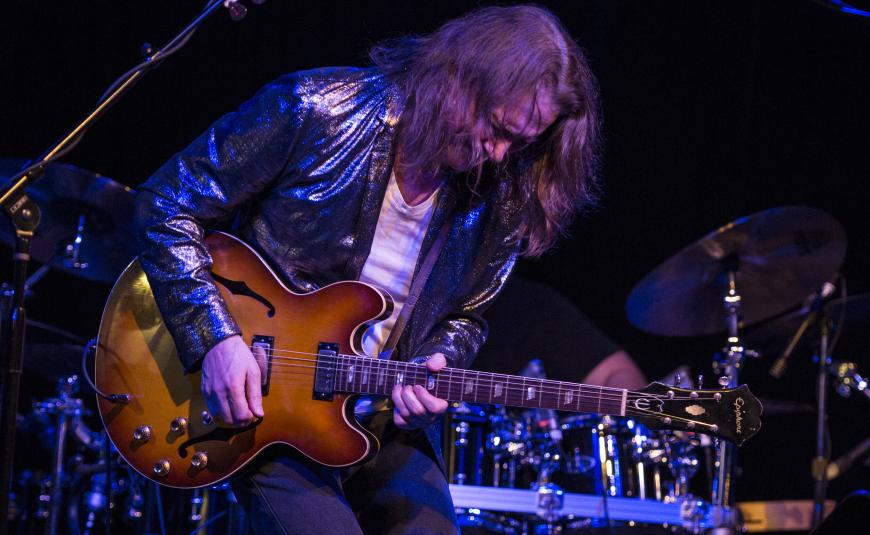
“The Omni Foundation Guitar Series has become the leading series for classical guitar in the U.S.,” declares founder and director Richard Patterson. He’s not bragging. But he’s quick to point out that the series’ 43rd season, which opens at the Palace of Fine Arts this Friday (Sept. 16), kicks off in a “festive, exciting,” and distinctly non-classical mode, with a rare appearance by another California native, and now Paris expatriate, Robben Ford.
Ford was already on his way to legendary guitar status when Patterson returned from service in Vietnam in 1971, carrying a Gibson guitar with small shrapnel holes in its body. The guitar had seen service in informal pop music jams among his fellow draftees, “to forget where we were.”
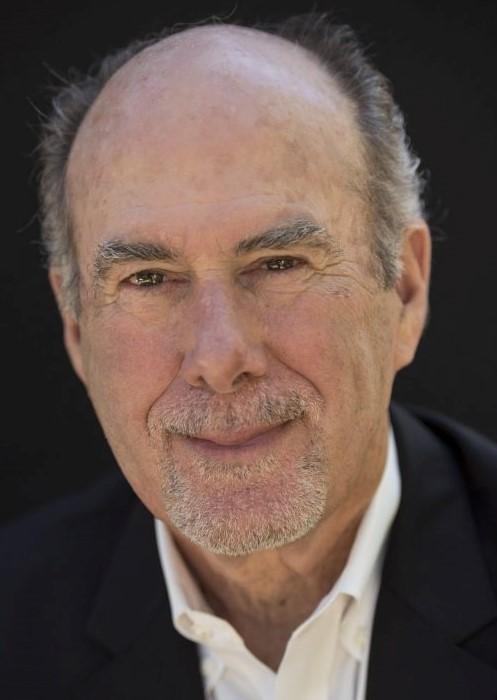
After committing himself to a life of music and formal study at the University of California, Santa Cruz, Patterson started taking notice both of jazz and of the somewhat younger Ford, “who knew all the musicians who were top in the area and would get gigs at clubs. We were going, ‘Who is this kid? He’s amazing!’ And Robben played the tenor saxophone as well as he played the guitar. I’d buy his records and try to learn his phrasing and solos and transitions from chord to chord.”
The Charles Ford Blues Band had been formed from siblings Robben, Patrick, and Mark and named for their father, who was an amateur musician in their hometown of Ukiah. “It was a small town, but there were local bands playing whatever was popular on the radio in the early ’60s,” relates the 70-year-old Ford. “When I started my own group, it was more like Wilson Pickett and Junior Walker. I was just 13 when I first heard a Paul Butterfield Blues album, and by 15 or 16, I was a pretty good copycat of Mike Bloomfield [Butterfield’s guitarist]. We were just two hours north of San Francisco, where the scene was wailing, so we were going down to The Fillmore, Winterland, and the Avalon Ballroom to see everybody: Cream, Hendrix, all of them.”
Ford focused on the blues as “really good ground, where if you really have a soul, you’re going to resonate with it.” But both he and Patterson felt the pull of jazz. Patterson aspired to emulate jazz pianist Bill Evans on guitar, and his teacher advised him, “Then you’ll have to study classical in order to get your technique.” Patterson took the advice to Spain, studying with influential teacher José Tomás, himself a former student of Andrés Segovia. Returning to complete an advanced degree at San Francisco State University, he launched the Omni Series in reaction to the dearth of classical guitar concerts in the Bay Area. He also toured and recorded for Columbia Artists, in duos with flutist Bettine Clemen Ware and balalaika and mandolin virtuoso Emanuil Sheynkman. And he kept an eye on the far-reaching collaborations of his early idol, Robben Ford.
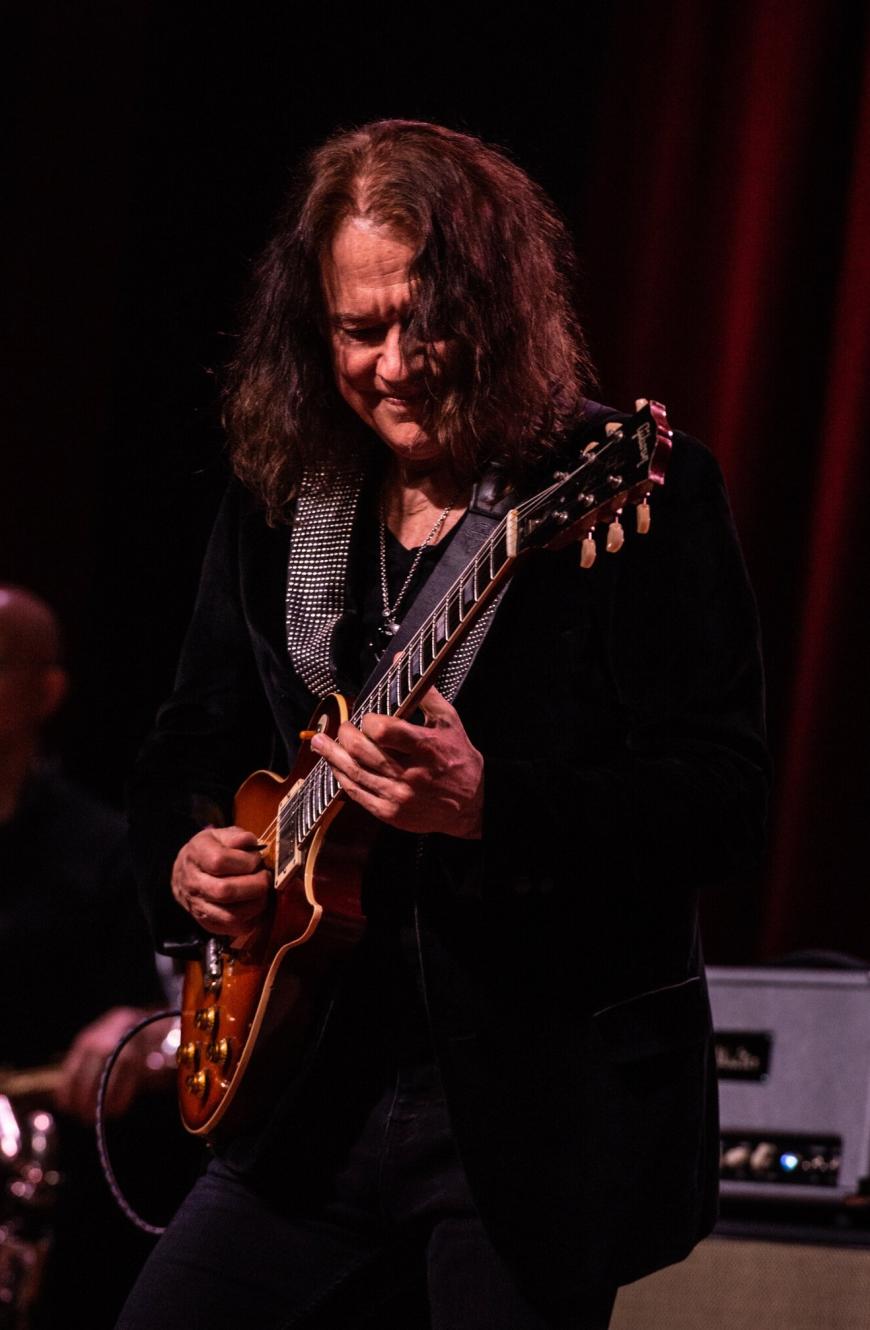
Ford recorded with Charlie Musselwhite and Jimmy Witherspoon and in the 1970s joined the L.A. Express, a jazz fusion band which toured with George Harrison and played on a couple of Joni Mitchell albums. Another fusion ensemble, the Yellowjackets, was a spinoff of Ford’s first of many solo albums, which eluded genre pigeonholing. “I hear very little in popular music that interests me at all,” says Ford, “but whenever it does, it’s always because it has some roots.” In the ’80s, he recorded with Kiss and with Miles Davis; in the ‘90s, with Dizzy Gillespie, Bonnie Raitt, and Toots Thielemans. “Sometimes I’m amazed at the company I’m in,” he laughs.
Work on Rickie Lee Jones’s 1991 album Pop Pop introduced him to iconic jazz bassist Charlie Haden, whose rural background made immediate sense to him. “Charlie wasn’t schooled the way a lot of musicians are. He came up as a folk musician,” Ford recounts. “And to play jazz the way Ornette Coleman did [Haden was part of Coleman’s visionary quartet], he didn’t learn it from Ornette. He just realized, ‘Finally, I’m with people who are playing music the way I hear it.’ That’s a lineage.”
Keeping deep blues feeling and facility flowing across genre lines is vital to Ford and to those who engage him, and he knows he’s a rare bird. “People who identify the blues as their base normally don’t explore classical music and certainly not free jazz,” he points out. “I’m a self-taught player, but something I always let people know is I got my chord knowledge from Mickey Baker’s Complete Course in Jazz Guitar, Book 1. I just happen to apply that very directly to traditional blues music; I’ve brought those two things together.”
“He’ll always surprise you with his chord voicings and harmonies,” remarks Patterson about Ford’s appeal. “And he makes it sound so natural.”
“That’s the goal of every musician,” adds Ford, “to have your musical knowledge and draw on that well but not know what’s going to happen next.” In live performance and online instruction, Ford inspires with speed, extended technique, and a seemingly boundless ability to transpose harmonic relationships to every possible position on his instrument’s fretboard.
There’s even been talk among fans about “the Robben Ford scale,” an embellishment of a minor pentatonic scale. But Ford insists, “I certainly didn’t invent it. It’s just that I heard the use of the major sixth a lot in B.B. King’s and Mike Bloomfield’s playing, and those have been my two greatest blues guitar heroes. It’s not really ‘in place of,’ it’s ‘in addition to’ the rest of the pentatonic scale [including the flat seventh], and it’s something a lot of people miss. I really just want to broaden people’s harmonic knowledge. There’s a lot more they can play, which fits into a very traditional system.”
Ford began authoring his own guides to blues guitar in the early ’90s. More recently, with help from his girlfriend Kelly Roberts (“a graphic designer and so much more than that”), he’s successfully extended his pedagogy to social media. Students can sign up for YouTube lessons and for access to the Guitar Dojo, which hosts occasional Zoom workshops on topics such as songwriting and riffing.
Roberts also encouraged Ford to post, live to Instagram, video of him playing a solo from Pure (earMUSIC, 2021), his first studio album since 1997 and the “best work I’ve done to date,” by Ford’s own proclamation.
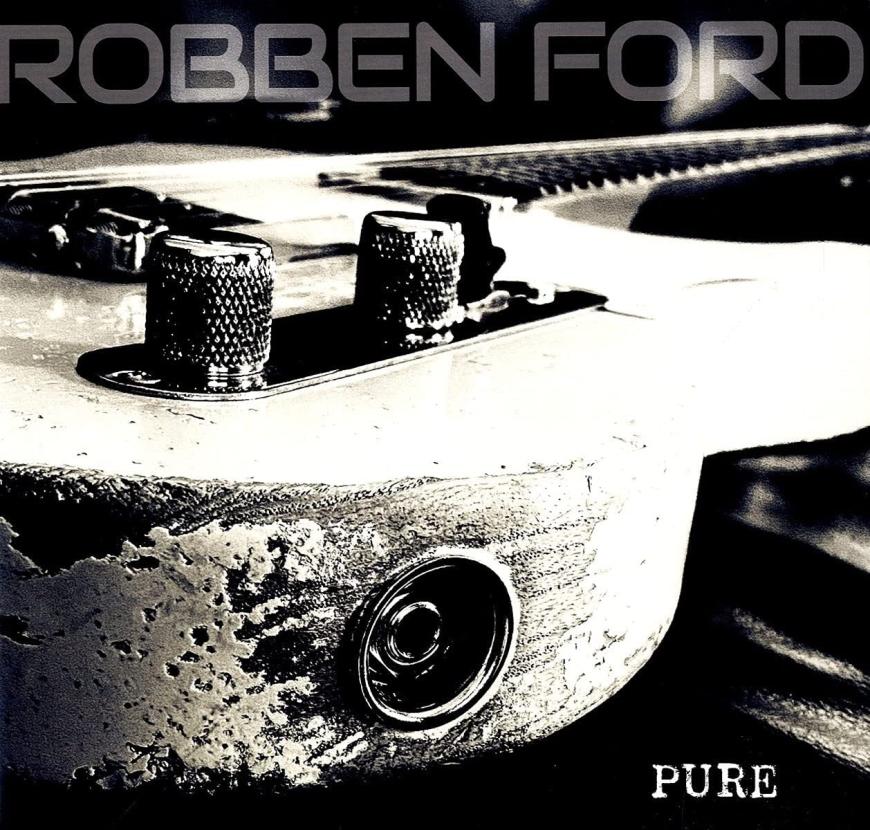
“Kelly told me, ‘When you’re in front of an audience, you become a different person,’ and at first it was scary,” Ford admits. “But then I realized she was right. And it’s one of my favorite things I’ve ever done. They were complete improvisations, not written, and we lit up Instagram.” Many of Ford’s recordings can be purchased on his website, including a previously unreleased 1996 recording of his band The Blue Line, recorded live at Yoshi’s in Berkeley a year before the venue relocated to Jack London Square.
This month’s trip to California, which will also include a performance in San Diego with former bandmate Tom Scott, will provide Ford and Roberts a chance to stop off in Nashville, their home before they relocated to the more “welcoming” ambience of Paris. They’ll then visit Ford’s extended family in Ukiah before driving down for the Omni gig at the Palace of Fine Arts, which the guitarist calls “literally one of my favorite places on the planet.”
Opening the Sept. 16 show will be 31-year-old guitar virtuoso Joe Robinson, a protege of fellow Australian and Omni regular Tommy Emmanuel. “Joe is a songwriter, has a great voice, and is a brilliant guitar player,” says Patterson. “He moved from Australia to Nashville, and that’s where he met Robben, and they became friends. My hope is that Robben will have Joe playing second guitar” — alongside recent Ford collaborators Andy Hess on bass, Doug Belote on drums, and Jovan Quallo on saxophone.
“We’ll play some music from Pure and some I’ve recorded with tenor saxophonist Bill Evans,” Ford says about what fans will hear at the Palace. “For a long time, I played primarily my own songs, with lyrics. But this will be kind of half instrumental, half my blues — and a couple of covers — and I’ll sing at least half the show.”
This season opener won’t be Patterson’s first departure from the classical programming for which Omni has become known nationally and internationally and which involves several co-presentations with San Francisco Performances. “Columbia Artists used to do an all-star guitar night with us,” he notes. “That might have, for example, Joe Pass, Pepe Romero, Leo Kottke, and Paco Peña — jazz, classical, fingerstyle, and flamenco. Tommy Emmanuel would present as a steel-string virtuoso, with Joe Robinson opening for him. But I’m really curious to see how the Palace audience will react to a jazz-blues-rock band.” He hopes the concert will recruit new attendees.
Ford has high hopes and few regrets, though he misses the masters he’s outlived after more than five decades in the music business. “Miles and Charlie [Haden] are gone — all of that happened a while ago,” he muses. “I would have liked to work with Michael Brecker, though I couldn’t have kept up with him. And I’d like to have more of that kind of thing now.” He shares a motto with the musically peripatetic bassist Dave Holland: “‘Plant your banner firmly in the desert sand!’ That’s where I’m at now. I honestly don’t care what anyone thinks. I want them to like what I do, surely. But I’m going to do it nonetheless.”




